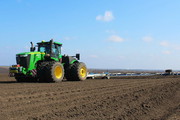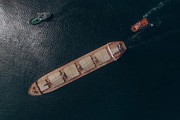News From Agro-Industrial Complex
The Verkhovna Rada will return to the idea of additional taxation of Ukrainian "daughters" of companies that have not left the Russian market
The Parliamentary Committee on Finance, Tax and Customs Policy will soon return to consideration of Bill No. 7232 on the introduction of additional taxation of the income of companies that continue to operate on the Russian market, the chairman of the committee, Danylo Hetmantsev said.
- Read more
- 775 reads
Sunflower prices in Ukraine are rising, while oil remains under the pressure of low demand
In the April balance sheet, USDA experts left the forecast for sunflower exports from Ukraine at 2.65 million tons (1.62 million tons in 2021/22), although actual exports may decrease due to restrictions on Ukrainian grain supplies to Poland, Romania, and Bulgaria. The forecast for sunflower processing in Ukraine in 2022/23 was increased by 0.2 to 10.4 million tons, and the estimate of ending stocks was reduced by 0.18 to 1.47 million tons, while last year they amounted to 4.69 million tons.
- Read more
- 1016 reads
The first cubic meters of biomethane gas were pumped into the gas transportation system of Ukraine
Ukraine has opened its first biomethane plant. Today, the first cubic meters of gas have been supplied to the gas distribution network. The plant will provide about 1,500 consumers per year.
- Read more
- 682 reads
Ukraine and Canada will sign updated free trade agreement
On April 11, 2023, during a working visit to Canada, Prime Minister of Ukraine Denys Shmyhal and Prime Minister of Canada Justin Trudeau signed a joint statement on the conclusion of negotiations to update the Canada-Ukraine Free Trade Agreement.
- Read more
- 588 reads
Ukrzaliznytsia’s freight traffic volumes in March hit record high since war started
In March 2023, Ukrzaliznytsia JSC transported 12.2 million tonnes of cargo, which is the highest monthly result since the Russian full-scale invasion started.
The relevant statement was made by Ukrzaliznytsia JSC Commercial Department Deputy Director Valerii Tkachov on Facebook, an Ukrinform correspondent reports.
- Read more
- 960 reads
Private property and competition are the best methods of fighting corruption, says Mykola Solskyi
Mykola Solskyi, Minister of Agrarian Policy and Food of Ukraine, took part in the presentation of the State Anti-Corruption Program for 2023-2025 by the National Agency for the Prevention of Corruption (NAPC). The Minister spoke at the panel discussion "Anti-Corruption Policy in Priority Areas: Defense, Infrastructure Rehabilitation, Digitalization, Land, Education".
- Read more
- 952 reads
Agricultural Production in Ukraine to Recover with World Bank Support
Funds in the amount of $132 million available for programs, including access to finance for small farmers.
- Read more
- 937 reads
Second ‘war’ sowing campaign: less grain, more oil crops projected
In 2023, Ukrainian farmers plan to increase oil crop area and partially reduce grain and corn area.
- Read more
- 1079 reads
The Road to Restoration: Post-War Recovery of the Ukrainian Agricultural Sector
The war started by Russia against Ukraine has left its mark on the country’s economy, particularly on agriculture. The disruption of supply chains and agricultural production has already caused significant damage to the people, the economy, and the environment of Ukraine. Despite these difficulties, the country faces the task of restoring the agriculture sector and making it sustainable.
- Read more
- 775 reads
Bulk carrier with 30,000 tonnes of humanitarian wheat for Yemen is moving along the “grain corridor” (Updated)
The bulk carrier NEGMAR CICEK, the sixth vessel under the Grain From Ukraine programme, has left the port of Chornomorsk and joined the caravan of three other vessels.
Yemen is a country in Asia that is suffering from a food crisis. The country will receive 30,000 tonnes of humanitarian Ukrainian wheat thanks to donations from the governments of the United States, France, and Spain.
- Read more
- 690 reads



















